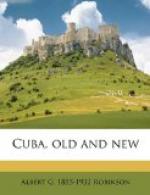If the idea of an inland location was, as it is said to have been, protection against pirates and buccaneers, it was not altogether a success. The distinguished pirate, Mr. Henry Morgan, raided the place very effectively in 1668, securing much loot. In his book, published in 1871, Mr. Hazard says: “Puerto Principe (the present Camaguey) is, probably, the oldest, quaintest town on the island,—in fact, it may be said to be a finished town, as the world has gone on so fast that the place seems a million years old, and from its style of dress, a visitor might think he was put back almost to the days of Columbus.” There have been changes since that time, but the old charm is still there, the narrow and crooked streets, forming almost a labyrinth, the old buildings, and much else that I earnestly hope may never be changed. There is now an up-to-date hotel, connected with the railway company, but if I were to go there again and the old hotel was habitable, I know I should go where I first stayed, and where we occupied a huge barrack-like room charged on our bill as “habitaciones preferentes,” the state chamber. It had a dirty tiled floor, and was the home of many fleas, but there was something about it that I liked. I do not mean to say that all of Camaguey, “the city of the plain,” is lovely, or picturesque or even interesting. No more is all of Paris, or Budapest, or Amsterdam, or Washington. They are only so in some of their component parts, but it is those parts that remain in the memory. The country around the city is a vast plain, for many years, and still, a grazing country, a land of horses and cattle. The charm is in the city itself. If I could see only one place outside of Havana, I would see Camaguey. A little less than fifty miles to the north is Nuevitas, reached by one of the first railways built in Cuba, now if ever little more than the port city for its larger neighbor. Columbus became somewhat ecstatic over the region. Perhaps it was then more charming, or the season more favorable, than when I saw it. I do not recall any feeling of special enthusiasm about its scenic charms. Perhaps I should have discovered them had I stayed longer. Perhaps I should have been more impressed had it not been for the impressions of Camaguey. I saw Nuevitas only briefly on my way eastward on that memorable excursion by construction train and saddle. The only route then available was by boat along the north shore, and it was there that we caught the steamer for Santiago.




